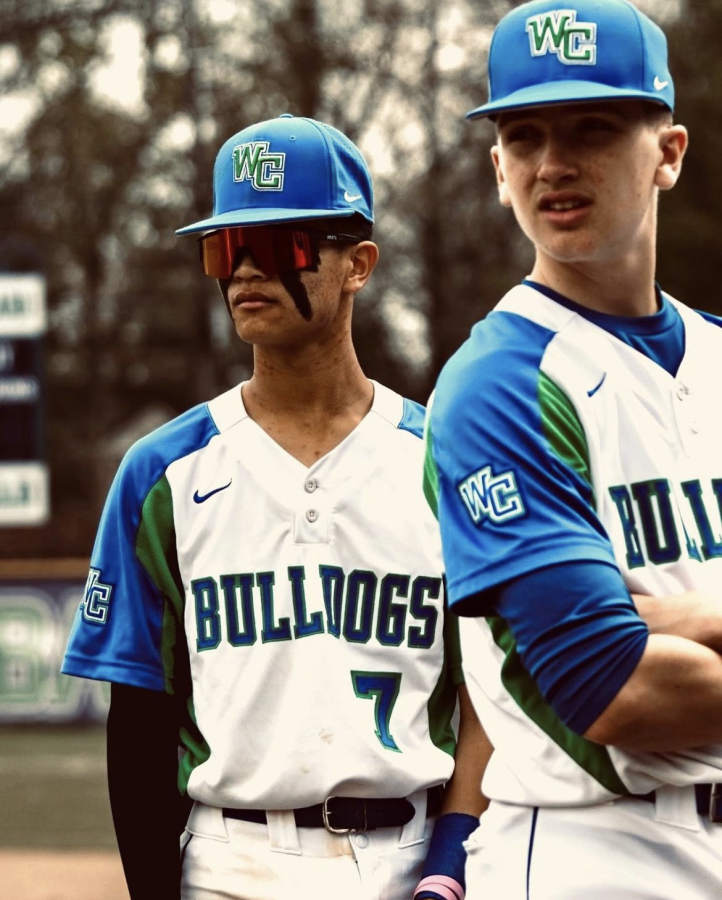NIL deals pave the way for WCHS athletes to get paid
WCHS senior Eric Chen shows off his recent NIL deal with sports clothing brand Sleefs in a joint Instagram post with the brand.
May 15, 2023
Name. Image. Likeness. This combination of elements, known as NIL, gives a person the right to control the commercial use of their identity for financial gain, as stated by the MPSSAA.
You may have never heard of what NIL deals are, and it is probably because these deals were almost nonexistent two years ago. In the 2021 Supreme Court case National Collegiate Athletic Association (NCAA) versus Alston, the court unanimously ruled against the NCAA, authorizing college athletes to use their NIL for compensation after the NCAA banned the practice. Now, the MPSSAA has expanded this ruling to allow even high school student athletes to accept NIL deals, becoming the 24th state to allow NIL at the high school level.
“I am very happy that they are allowing [NIL deals] as it is long overdue,” WCHS Athletic Director Jesse Smith said. “No athlete should be prevented from making money off of themselves and their abilities.
Within the first year after the ruling, the average NIL transaction for a college athlete was $1,818. Although there are no statistics for high school athletes, it has been proven that they greatly benefit from NIL deals, even though most are not cashing out on thousand-dollar payouts.
“I think most high school athletes are definitely responsible enough to handle these deals,” WCHS senior and baseball player Eric Chen, who currently has a NIL deal with the clothing brand Sleefs, said. “I have been paid $20 so far in the first month of being with Sleefs as well as receiving a few free products they sent me such as bracelets and shirts …[and] a discount code others can use for the store.”
Chen has been wearing the brand for the majority of his time playing baseball and felt it would be exciting to represent their brand. The rules with NILs are simple: illustrate a positive image and consistently promote the brand or three strikes and you are out.
“It is typical that [those with NILs] would be an athlete with some positive reputation as well as someone who is willing to post about the brand frequently and gets the message across,” Chen said. “Just don’t demote or criticize the brand and give it a bad label. Lastly, you should do it if you’re actually going to promote it; don’t just do it to say you have a NIL and not even put forth any effort.”
While rules between the brand and the athlete exist, athletes must also follow the statutes and limitations with administrators such as the MPSSAA if they want to continue showcasing their talent. In their guidelines, students may not endorse illegal products or services for underage individuals or video games and also cannot wear “a school-based team jersey or otherwise displaying the school’s name, mascot, logo, or any other school identifying marks when marketing a NIL product or service” and much more. Nonetheless, Chen believes these rules should not be too difficult to follow.
“There are restrictions and rules you have to follow, but it is nothing that an athlete can’t handle,” Chen said. “Although some athletes receive their first NIL deals in college, I think that as long as you understand the policies and follow them, no high school athlete should have any issue.”
Although the perks of NIL deals are extensively displayed, many unforeseen consequences could appear soon. With collegiate athletes, many believe they are recklessly using their endorsements and athletes could fall bait into misleading and illegitimate deals that could damage their reputation or career. Luckily, the MPSSAA hopes to combat these practices by being the first state to expressly prohibit NIL collectives within schools, an approach in which high schools or groups form coalitions to provide NIL opportunities to student athletes from that school; this practice has been criticized as unethical and spraying unnecessary amounts of money to athletes.
“I don’t think [this will be any concern for student athletes]. I think this will only benefit those that are nationally recognized or have a large social media following. Even then, large NIL deals like we hear about at major university football programs or elsewhere will be rare for our local student athletes,” Smith said. “If a student athlete is responsible enough to have an afterschool job, they are responsible enough to have a NIL deal.”
We will not be able to know the effects that NIL deals will have on the high school sports landscape in the next few years, but it is sure that the formation of NIL deals is a pivotal step forward in giving more freedom to student athletes.“There can be small risks since you are partnered with a brand and they promote you to their whole audience,” Chen said. “It is more of an honor and responsibility to have a NIL deal; not everyone has the chance to be publicized by a brand and get paid for it, so if you get the opportunity, I would definitely recommend it.”



